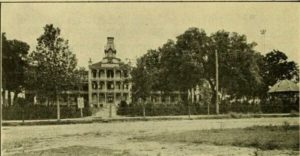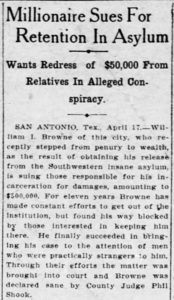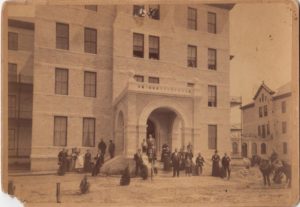
Southwestern Insane Asylum in San Antonio
Though many asylum patients did need medical/psychological care, many others were in an institution for the convenience–or by the desire–of their families. One unfortunate individual, William I. Browne, was probably incarcerated for both these reasons.
Browne was a heavy drinker who undoubtedly embarrassed his family or gave them trouble in some way, and they felt he needed to go to an insane asylum. To commit someone to such an institution, Texas law required “an affidavit of the examining physician . . . and a certificate from the county judge of the county where the person resides.” The Palestine Daily Herald (Texas) reported years later that Browne had received a cursory examination by Dr. Miguel Barragon (or Arragon), the Mexican consul at Brownsville, Texas, but had not otherwise been given due process.
Browne constantly fought for his release, but his wife was indifferent to his plight, as were his siblings. Not a wealthy man when he entered the Southwestern Insane Asylum in San Antonio, Browne inherited some valuable property from his father shortly after he was committed. Browne’s siblings subsequently controlled both his inherited property as well as property Browne had owned before his commitment. The value of both grew over the years.

Newspaper Account of Browne’s Lawsuit
After more than a decade in the asylum, Browne successfully brought his cause to court. After Browne answered a number of complicated questions, County Judge Phil Shook released him as a sane man. At this point Browne not only had a chance to enjoy his freedom, but to also learn about the personal wealth he had accumulated. He promptly sued his siblings for $50,000 (worth more than $1.3 million today).

A Relaxed Group of People at the Southwestern Insane Asylum
Newspaper accounts detail the facts above, though articles about the outcome of Browne’s lawsuit against his siblings are absent. The Houston Post reported on June 23, 1916 that Browne’s body had been found floating in the Rio Grande near Brownsville, TX where his brother, Albert, was mayor.